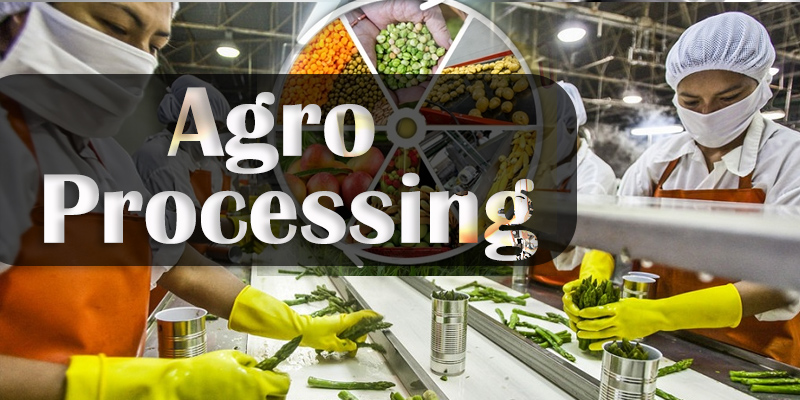
શિલ્પકાર તાલીમ યોજના (CTS) - એગ્રો પ્રોસેસિંગ સંપૂર્ણ અભ્યાસક્રમ
ટ્રેડનું નામ: એગ્રો પ્રોસેસિંગ (Agro Processing)
NSQF સ્તર: લેવલ 4
સમયગાળો: 1 વર્ષ
પ્રવેશ લાયકાત: 10મું ધોરણ પાસ (વિજ્ઞાન અને ગણિત સાથે)
ઉદ્દેશ્ય: કૃષિ ઉત્પાદનોની પ્રક્રિયા, પેકેજિંગ, ગુણવત્તા નિયંત્રણ, અને ઉદ્યોગમાં રોજગાર માટે કૌશલ્ય વિકાસ.
અભ્યાસક્રમની ઝાંખી
એગ્રો પ્રોસેસિંગ ટ્રેડનો અભ્યાસક્રમ કૃષિ ઉત્પાદનો જેવા કે અનાજ, ફળો, શાકભાજી, અને દૂધ ઉત્પાદનોની પ્રક્રિયા પર કેન્દ્રિત છે. આ સૈદ્ધાંતિક અને વ્યવહારિક તાલીમને સંતુલિત કરે છે, જેમાં 70% વ્યવહારિક અને 30% સૈદ્ધાંતિક તાલીમનો સમાવેશ થાય છે.
- ટ્રેડ થિયરી
- ટ્રેડ પ્રેક્ટિકલ
- વર્કશોપ ગણતરી અને વિજ્ઞાન
- ઇજનેરી ડ્રોઇંગ
- રોજગાર કૌશલ્ય
વિગતવાર અભ્યાસક્રમ
1. ટ્રેડ થિયરી
- એગ્રો પ્રોસેસિંગનો પરિચય: ખાદ્ય પ્રક્રિયા ઉદ્યોગનું મહત્વ, ઇતિહાસ, અને બજાર વલણો.
- કાચો માલ: અનાજ, ફળો, શાકભાજી, દૂધ, અને મસાલાની ગુણવત્તા અને સંગ્રહ.
- પ્રક્રિયા તકનીકો: સૂકવણી, ગ્રાઇન્ડીંગ, ફર્મેન્ટેશન, નિષ્કર્ષણ, અને પેસ્ટ્યુરાઇઝેશન.
- ખાદ્ય સલામતી: FSSAI ધોરણો, માઇક્રોબાયોલોજીકલ પરીક્ષણ, અને સ્વચ્છતા પદ્ધતિઓ.
- ઉપકરણો: ગ્રાઇન્ડર, મિક્સર, ડ્રાયર, અને પેકેજિંગ મશીનો.
- ગુણવત્તા નિયંત્રણ: ઉત્પાદનનું વિશ્લેષણ, સ્વાદ, અને શેલ્ફ-લાઇફ પરીક્ષણ.
- પેકેજિંગ અને લેબલિંગ: વેક્યૂમ પેકિંગ, FSSAI-અનુરૂપ લેબલ, અને પેકેજિંગ સામગ્રી.
- પર્યાવરણ અને કચરો વ્યવસ્થાપન: કચરો ઘટાડવો, પુનઃચક્રણ, અને બાયોગેસ ઉત્પાદન.
- નિયમો: ખાદ્ય નિયમો, નિકાસ ધોરણો, અને ઉદ્યોગ નીતિઓ.
2. વર્કશોપ ગણતરી અને વિજ્ઞાન
- ગણતરી: સામગ્રીનું પ્રમાણ, ઉત્પાદન ખર્ચ, અને ઉત્પાદન આયોજન.
- વિજ્ઞાન: ખાદ્ય રસાયણ, pH, ગરમી, અને માઇક્રોબાયોલોજી.
- ઉપયોગ: પ્રક્રિયા સમય, તાપમાન, અને મિશ્રણ ગણતરી.
3. ઇજનેરી ડ્રોઇંગ
- મૂળભૂત ડ્રોઇંગ: રેખાચિત્રો, સ્કેલ, અને પરિમાણો.
- પ્રોસેસિંગ યુનિટ લેઆઉટ: ખાદ્ય પ્રક્રિયા એકમનું ડિઝાઇન અને કાર્યપ્રવાહ.
- ઉપકરણ ડ્રોઇંગ: ગ્રાઇન્ડર, ડ્રાયર, અને પેકેજિંગ મશીનના સરળ ચિત્રો.
4. રોજગાર કૌશલ્ય
- સંચાર કૌશલ્ય: ગ્રાહકો અને સપ્લાયર્સ સાથે સંવાદ.
- આઇટી સાક્ષરતા: એમએસ ઓફિસ, ઇન્વેન્ટરી સોફ્ટવેર, અને ડેટા એન્ટ્રી.
- ઉદ્યમશીલતા: નાનું ખાદ્ય પ્રક્રિયા એકમ શરૂ કરવું.
- કાર્ય નીતિ: સમય વ્યવસ્થાપન, સ્વચ્છતા, અને વ્યાવસાયિકતા.
- સલામતી: ખાદ્ય સલામતી, પ્રાથમિક સારવાર, અને આગ સલામતી.
5. ટ્રેડ પ્રેક્ટિકલ
- કાચા માલની તપાસ: અનાજ, ફળો, અને દૂધની ગુણવત્તા અને સંગ્રહ.
- પ્રક્રિયા તકનીકો: અનાજનું ગ્રાઇન્ડીંગ, ફળોનું જામ બનાવવું, અને દૂધ પેસ્ટ્યુરાઇઝેશન.
- ઉપકરણ સંચાલન: ગ્રાઇન્ડર, ડ્રાયર, અને પેકેજિંગ મશીનનો ઉપયોગ અને જાળવણી.
- ગુણવત્તા પરીક્ષણ: સ્વાદ, રચના, અને શેલ્ફ-લાઇફ વિશ્લેષણ.
- પેકેજિંગ: વેક્યૂમ પેકિંગ, સીલિંગ, અને લેબલિંગ.
- ઉત્પાદન વિકાસ: નવા ઉત્પાદનો જેવા કે જૂસ, અથાણું, અથવા નાસ્તા બનાવવા.
- કચરો વ્યવસ્થાપન: બાયોગેસ ઉત્પાદન અને કાર્બનિક કચરો રિસાયક્લિંગ.
- પ્રોજેક્ટ કાર્ય: એક ખાદ્ય ઉત્પાદન (જેમ કે, જામ)નું ઉત્પાદન અને પ્રસ્તુતિ.
પરીક્ષા પેટર્ન
પરીક્ષામાં પ્રેક્ટિકલ અને કોમ્પ્યુટર આધારિત ટેસ્ટ (CBT)નો સમાવેશ થાય છે.
- પ્રેક્ટિકલ: 300 ગુણ (ઉત્પાદન બનાવટ, ઉપકરણ સંચાલન, અને ગુણવત્તા તપાસ).
- CBT: 150 ગુણ, 75 પ્રશ્નો, 2 કલાક (ટ્રેડ થિયરી, વર્કશોપ ગણતરી અને વિજ્ઞાન, ઇજનેરી ડ્રોઇંગ, રોજગાર કૌશલ્ય).
- પરીક્ષા સમય: ડિસેમ્બર (CTS), જુલાઈ/ઓગસ્ટ (AITT/ATS).
- પ્રમાણપત્ર: ઉત્તીર્ણ ઉમેદવારોને NCVT તરફથી રાષ્ટ્રીય વ્યાપાર પ્રમાણપત્ર (NTC) મળે છે.
સંસાધનો
- DGT વેબસાઇટ પરથી અભ્યાસક્રમ અને અપડેટ્સ ડાઉનલોડ કરો.
- ભારત સ્કિલ્સ પર ઇ-લર્નિંગ સામગ્રી, વિડિયો, પ્રશ્ન બેંક, અને મોક ટેસ્ટ.
- CSTARI પર NSQF-અનુરૂપ અભ્યાસક્રમ વિગતો.
નોંધ: અન્ય ભાષાઓમાં અભ્યાસક્રમ જોવા માટે ભાષા સ્વિચરનો ઉપયોગ કરો. PDF ડાઉનલોડ માટે અહીં ક્લિક કરો.
Trade Type
Below is the detailed syllabus for the Trade Practical component of the ITI Trade "Agro Processing." This hands-on section is designed to equip students with the technical skills required to process agricultural products, operate machinery, ensure quality control, and maintain safety standards in the agro-processing industry.
Trade Practical Syllabus for ITI Trade "Agro Processing"
Pre-Processing Techniques
- Cleaning: Use manual and mechanical methods (e.g., sieves, blowers) to clean raw agricultural products.
- Sorting and Grading: Sort and grade products based on size, color, and quality using graders and sorting tables.
- Washing and Drying: Wash and dry products to prepare them for further processing.
Processing Methods
- Milling and Grinding: Operate mills and grinders to process cereals, pulses, and spices into flours and powders.
- Oil Extraction: Use oil expellers and filters to extract and refine oils from oilseeds.
- Drying and Dehydration: Practice moisture removal techniques with dryers and dehydrators for fruits, vegetables, and spices.
- Canning and Preservation: Gain hands-on experience with canning equipment and preservation methods (e.g., heat treatment, preservatives).
- Specialized Processing: Learn techniques for specific products like rice parboiling, soya processing, and spice blending.
Packaging and Labeling
- Material Selection: Choose appropriate packaging materials (e.g., bags, containers, vacuum packs) for processed products.
- Packaging Operations: Operate packaging machines to seal and pack products while maintaining hygiene.
- Labeling: Apply labels with required details (e.g., product name, ingredients, expiry date) as per industry standards.
Quality Control Tests
- Moisture Testing: Conduct moisture content tests using moisture meters.
- Purity Checks: Perform purity assessments and visual inspections for contaminants.
- Sensory Evaluation: Assess sensory qualities (e.g., taste, texture, color) of processed products.
- Documentation: Record and interpret test results to ensure compliance with quality standards.
Machinery Operation and Maintenance
- Equipment Handling: Operate key agro-processing equipment (e.g., mills, grinders, extractors, dryers) under supervision.
- Maintenance Tasks: Perform routine cleaning, lubrication, and adjustments on machinery.
- Troubleshooting: Identify and resolve common operational issues in processing equipment.
- Safety Protocols: Follow safety guidelines while handling machinery and tools.
Product-Specific Practical Sessions
- Pulses: Practice dehusking, splitting, and polishing.
- Cereals: Perform milling and fortification.
- Spices: Grind, blend, and package spices.
- Oilseeds: Crush, extract, and refine oils.
- Rice and Soya: Process through parboiling, puffing, and texturizing.
Safety and Hygiene Practices
- Protective Gear: Demonstrate proper use of personal protective equipment (PPE) in the processing unit.
- Sanitation: Practice hygiene protocols to prevent contamination.
- Safety Measures: Implement precautions for handling heavy machinery and sharp tools.
- Emergency Training: Participate in emergency drills and first-aid exercises.
Simulated Projects
- End-to-End Processing: Work on small-scale projects to process a specific agricultural product from start to finish.
- Team Workflow: Collaborate in teams to simulate a processing unit, covering pre-processing, processing, quality checks, and packaging.
This syllabus provides comprehensive practical training, ensuring students develop the skills needed to excel in the agro-processing industry. Through hands-on experience, they will be prepared for roles such as Quality Analyst, Supervisor, or Skilled Worker in agro-processing units.
- 17 views